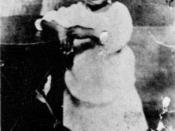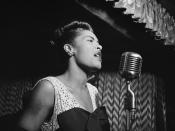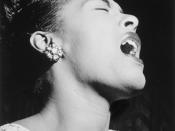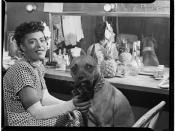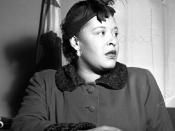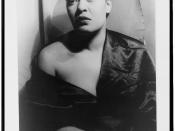Billie Holiday was born Eleanora Fagan Gough April 7th 1915 in Philadelphia. Her mother was thirteen at the time of her birth and her father was fifteen. She was raised by her mother, and had a weak relationship with her father, who was a guitarist in Fletcher HendersonÃÂs orchestra. Billie was sent to a Catholic reform school when she was ten, because she said that she was raped. Even though she was supposed to stay until she was an adult, with the help of family, she dropped out of school when she was only in the fifth grade, and got a job running errands in a brothel. Billie and her mother moved to Harlem, where she was arrested for prostitution. After living in New York for only three months, her mother caught their neighbor raping her. He was sentenced to only three months in Jail.
The start of her career was anything but intentional.
She auditioned in a speakeasy for a position as a dancer; however, there were no openings, so she auditioned to become a singer and the owner was amazed.
By luck one night she was filling in for a more popular singer of the club and John Hammond, a Jazz writer and producer, thought she was the greatest singer that he had ever heard. He heard a style that had more of a blues feel that was dramatically intense than the more popular light feeling that was popular with Jazz singers of the time, there was nothing upbeat about her music or her life. John Hammond brought Benny Goodman to one of her performances. She then recorded a demo with Columbia.
In the early 1930ÃÂs John Hammond had her working with the greatest musicians of the time including: Benny Goodman, Teddy Wilson, Duke Ellington, Ben Webster, and most importantly, the saxophonist Lester Young. Lester Young is an important figure in BillieÃÂs life. He helped to write some of her greatest works, helping her accomplish music that would show her strong points and flaunt her beautiful voice. They grew to be friends and Young gave her the nickname ÃÂLady DayÃÂ, she called him ÃÂPrezÃÂ.
One of the most controversial songs that Billie Holiday ever sang was ÃÂStrange FruitÃÂ. It was a song about the lynching of a black man, and although it was banned by numerous radio stations Billie kept singing it. She said that it reminded her of the death of her father. Columbia records wouldnÃÂt even let her record it; she ended up recording the song with a smaller label named Commodore. Billie ended up recording some of her most famous songs with this label.
Around this time, in the early 1940ÃÂs Billie began to abuse drugs.
August 25, 1941 she married trombonist Jimmy Monroe. Also at this time she began to date her drug dealer, Joe Guy who was a trumpet player, moved in with him and became his common law wife. In 1947 she ended both relationships and within the year was arrested for possession of narcotics and sent to a penitentiary of women in West Virginia. Because of this conviction she would loose her Cabaret Card and not play in a club for the last twelve years of her life.
By the 50ÃÂs BillieÃÂs drinking and drug use was at its worst. She married Louis McKay, a mafia enforcer, and although he tried to get her off drugs it never worked. At the time of BillieÃÂs death they were separated. Billie admitted openly to being bi-sexual and even had relationships with some famous actresses such as Tallulah Bankhead.
She went to the hospital because of her failing health, and was placed under arrest while she was there for possession. At the time of her death she had less than a thousand dollars to her name. She died from cirrhosis of the liver on July 17, 1959 at the age of 44.
To this day artists pay tribute to her work and her life.
Works Cited"Billie Holiday." Wikipedia. 15 Nov. 2006 http://en.wikipedia.org/wiki/Billie_Holiday .
Yannow, Scott. "Biography." The Unoffical Billie Holiday Website. 16 Nov. 2006 .
Bush, John. "Billie Holiday." VH1. All Music Guide, VH1. 15 Nov. 2006 .
